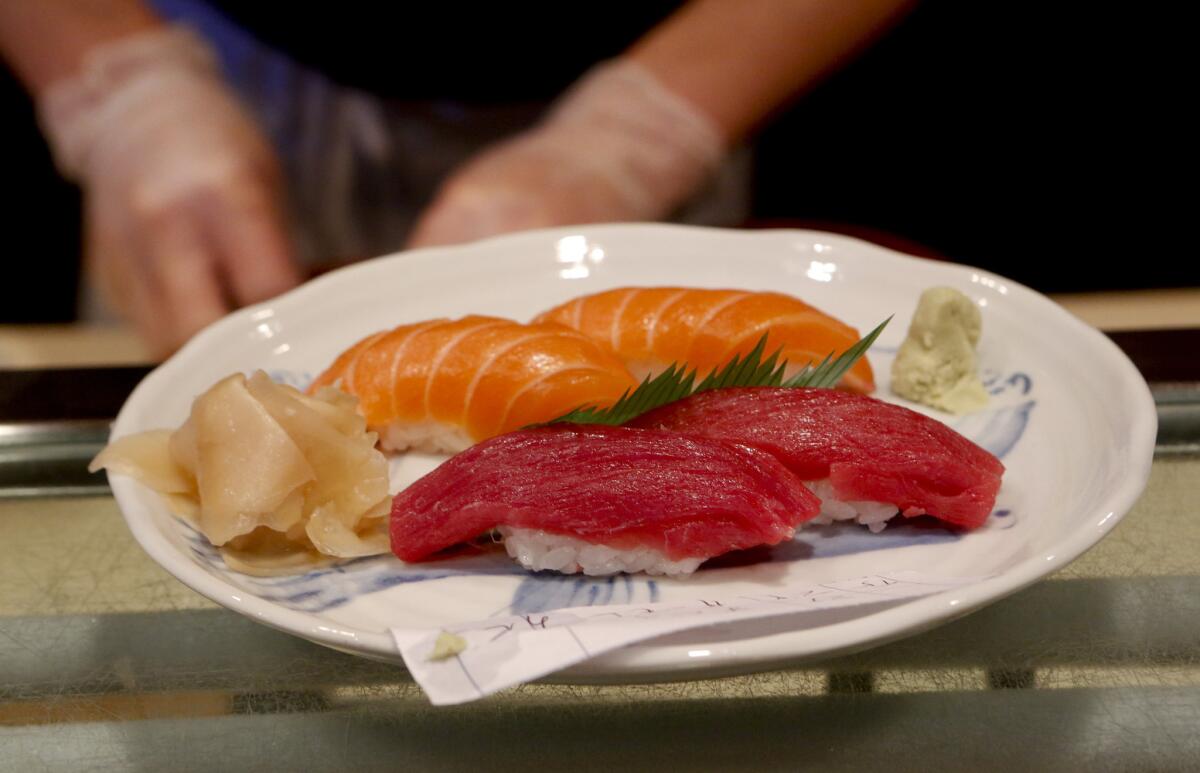California Legislature repeals glove law for food handlers

- Share via
California lawmakers have pulled an about-face on a controversial change to the state’s health code that bans restaurant workers from touching food with their bare hands and requires chefs and bartenders to wear gloves.
The Senate voted 32 to 0 Thursday to repeal the law that went into effect Jan. 1. The measure was previously approved by the Assembly.
A sweeping backlash against the glove law helped propel efforts to quash the bare-hand ban, which was intended to curb food-borne illnesses.
“After that bill was enacted a vast number of our local restaurants and bars raised very serious questions about the prohibition,” Sen. Kevin de León (D-Los Angeles) told his colleagues in Sacramento. He noted that the proposed repeal, AB 2130, would return previous language to the health code that says employees should “minimize” bare-handed contact with food.
It’s a coup for restaurant industry workers who petitioned in support of a repeal, arguing that hand washing is as effective as wearing gloves, without the added cost or environmental effects of what would amount to millions of discarded gloves.
De León said the bill had to be approved Thursday so Gov. Jerry Brown would have time to sign it before local health agencies begin enforcing it, following a six-month grace period, on Tuesday.
Assemblyman Richard Pan (D-Sacramento), who introduced the bill, said he was confident the governor would sign the repeal measure.
The ban applies to bartenders, who often use bare hands to prepare and garnish cocktails.
“It was going to cost bars a lot of money, not just in the number of gloves,” said bartender Joshua Miller of Alameda, Calif. “Having to change gloves constantly slows down service, and for a busy bar, time is money. Yet nobody outside of the corporate bar and restaurant community knew anything about it.
“My initial reaction was, ‘Where do I sign the petition [against it]?’ But there wasn’t one,” said Miller, who in February created a petition opposing the law on change.org.
His petition and one started by Iso Rabins, founder of a business incubator for food makers in San Francisco, garnered more than 19,000 signatures combined.
“This law would have made people less safe because of a false sense of security. You’re less aware of your hands being dirty and more likely to engage in risky behavior. You touch chicken, touch the trash, touch something else,” Rabins said.
Food safety experts say hand washing doesn’t occur enough in general, whether workers are bare-handed or wearing gloves. A study by the Centers for Disease Control on hand washing and hygiene behavior in restaurants found that workers who wore gloves were less likely than those not using gloves to wash their hands when they should.
“The good thing that came out of this is awareness,” said Mary FitzGerald of Safe & Sound Food Safety Consultants. “There should be more emphasis on training and not whether you use gloves or not. It’s something that everybody’s not doing enough of.”
Legislators may yet revisit the issue.
“It is the industry standard in restaurants to prioritize cleanliness when handling food, and the repeal of the glove law will still emphasize these standards,” Assemblyman Pan said. “Unfortunately the focus from last year’s law was just on gloves, and until we repeal the glove law we can’t have a meaningful stakeholder discussion on food safety in the restaurant industry.”
Los Angeles chefs who spoke vehemently against the law said they were relieved by the impending repeal.
Neal Fraser, the chef behind several L.A. restaurants including the soon-to-open Redbird at Vibiana, said Thursday of the repeal legislation, “I think it’s a good thing, it’s a very amazing thing. It’s especially good for the environment.
“And do I think that not wearing gloves and washing hands is better than wearing gloves and not washing your hands? Absolutely.”
Many cooks who already use gloves will continue to do so.
“The Subways of the world already have internal corporate policies in place requiring glove use,” said Jordan R. Bernstein, an attorney at Michelman & Robinson in Encino, who works with restaurant clients and has publicly opposed the law. “This was a quick-trigger attempt by the Legislature to fix a problem but without actually analyzing the issues.”
At Sushi Gen in Little Tokyo, chef Toshiaki Toyoshima and his kitchen staff have been wearing gloves since January, despite the enforcement grace period, to get used to shaping sushi with gloved fingers.
“We get so many calls complaining about the gloves,” said Toyoshima, who is also vice president of the Japanese Restaurant Assn. of Southern California. “Many sushi chefs will be happy.”
[email protected]
Twitter: @bettyhallock
Patrick McGreevy in Sacramento contributed to this report.
More to Read
Sign up for Essential California
The most important California stories and recommendations in your inbox every morning.
You may occasionally receive promotional content from the Los Angeles Times.











